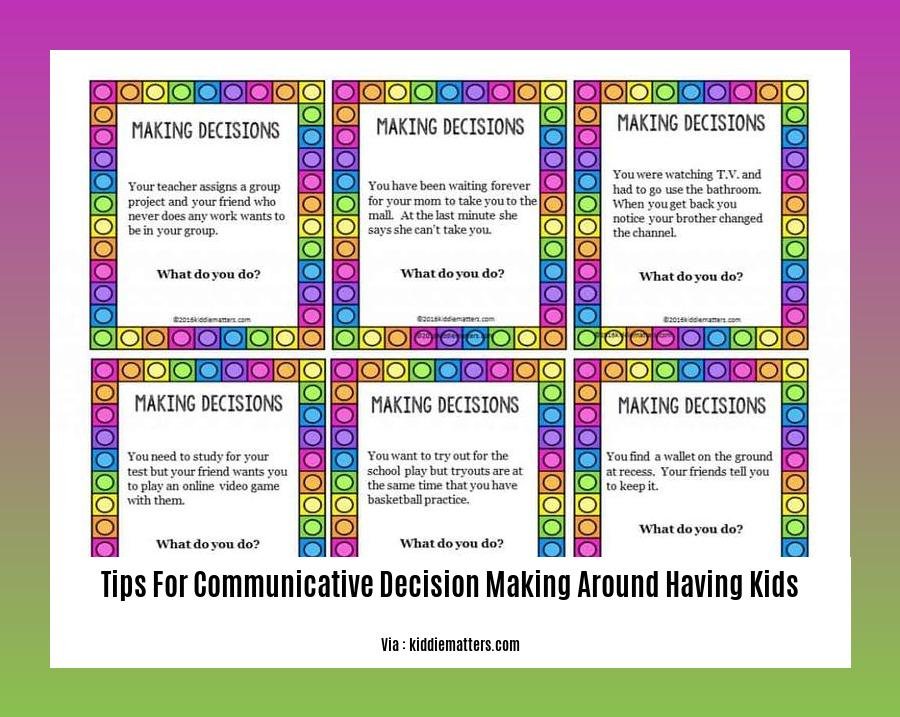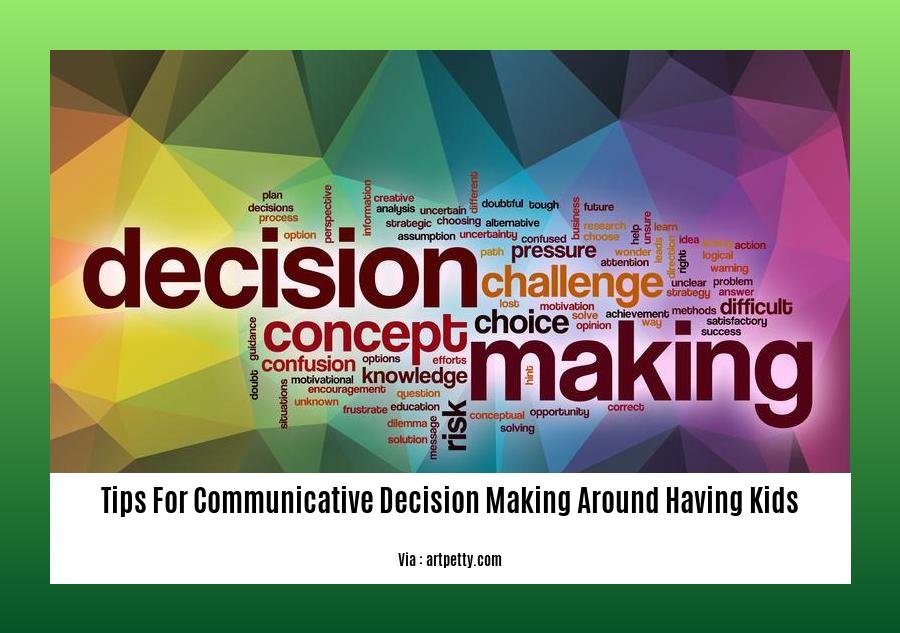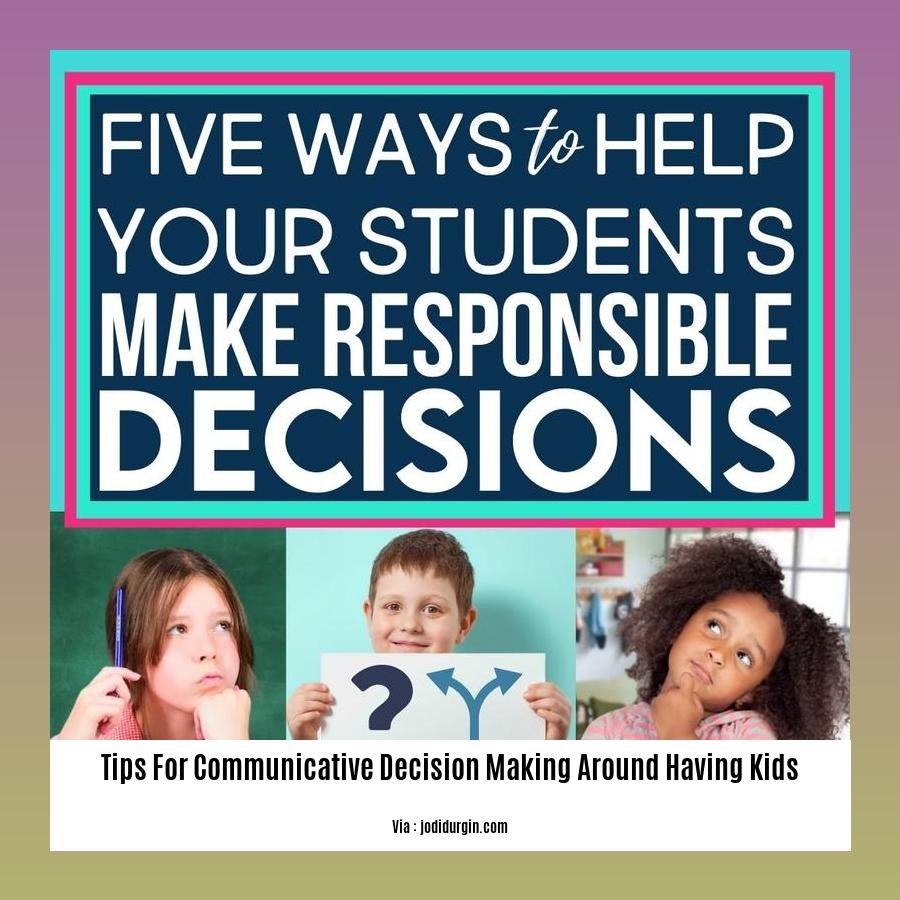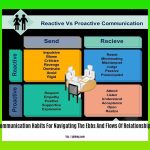Tips for Communicative Decision-Making Around Having Kids: Are you and your partner considering starting a family? If so, it’s crucial to engage in open and honest communication about this life-altering decision.
Key Takeaways:

- Communicate actively: Listen attentively without judgment
- Create a safe space: Encourage open expression without judgment
- Consider nonverbal cues: Body language and tone convey empathy
- Validate emotions: Acknowledge children’s feelings, even if you disagree
- Use open-ended questions: Foster dialogue and exploration
- Express yourself respectfully: Use “I” statements to avoid blame
- Prioritize quality time: Dedicate specific time for conversations
- Teach conflict resolution skills: Empower children to handle disputes healthily
Communicative Decision-Making Around Having Kids
Navigating the significant choice of having children requires open and honest communication between partners. Effectively conveying your thoughts, feelings, and expectations can significantly impact your decision-making journey.
Tips for Communicative Decision-Making
-
Create a Safe and Open Space for Discussion:
Foster an environment where both partners feel comfortable sharing their perspectives without judgment. -
Active Listening and Validation:
Listen attentively to your partner’s thoughts, acknowledging their feelings without dismissing them. -
Use “I” Statements:
Express yourself using “I” statements to avoid blaming or accusing. -
Empathize and Compromise:
Seek to understand your partner’s motivations and be willing to compromise when necessary. -
Explore Values and Goals:
Discuss your shared values and goals for your lives, including family planning. -
Consider Practical and Emotional Factors:
Address practical considerations like financial stability and career plans, as well as emotional factors such as your readiness for parenthood. -
Seek Professional Guidance if Needed:
If you encounter challenges in communicating or reaching a decision, consider seeking guidance from a therapist or family counselor.
Advantages of Communicative Decision-Making
- Clarity and Understanding: Open dialogue ensures a clear understanding of both partners’ perspectives.
- Reduced Conflict: Effective communication minimizes misunderstandings and potential conflicts.
- Shared Responsibility: Involving both partners in the decision-making process fosters a sense of shared responsibility.
- Stronger Bond: Honest communication strengthens the bond between partners, building trust and mutual support.
- Increased Satisfaction: Couples who make decisions together often report higher levels of satisfaction with their choice.
Interested in ways to get on the same page about your family’s future? Consider reading ways to get on the same page about parenting. It contains helpful information that can help you and your partner make decisions about your future.
If you’re looking to have a discussion with a partner regarding family planning and parenting choices, communicating around family planning and parenting choices might be a great read for you. Learn useful tips and tricks about parenting.
How to discuss fertility and family desires in a relationship is a topic that many couples who want to start a family can relate to. By clicking how to discuss fertility and family desires in a relationship you can learn useful conversation tips to help navigate this important topic.
Be willing to compromise and negotiate
When two people come together to make a life-altering decision like having children, it’s essential to approach the conversation with a willingness to compromise and negotiate. This doesn’t mean giving up on your dreams or settling for less than you want. Instead, it’s about finding a solution that works for both of you—a solution that respects both your individual needs and desires.
Key Takeaways:
- Be willing to listen to and understand your partner’s perspective.
- Be prepared to make concessions in exchange for something of value.
- Develop a strategy and know your BATNA (best alternative to a negotiated agreement).
- Practice active listening and empathize with your partner’s feelings.
- Build a strong relationship and establish clear goals.
Negotiating a mutually acceptable agreement can take time and effort, but it’s worth it. When you’re both on the same page, you can move forward with confidence, knowing that you’ve made the best decision for your future together.
Citation:
Shapiro Negotiations: Negotiating Strategy: How to Compromise to Win
Seek Professional Help if Needed
If the decision feels overwhelming, you might consider seeking professional help. A therapist or counselor can provide a safe and supportive space to explore your thoughts and feelings, facilitate communication with your partner, and help you develop coping mechanisms.
Key Takeaways:
- Understand when seeking professional help is beneficial.
- Identify factors that may indicate a need for external support.
- Know the benefits of seeking professional guidance.
Make a Decision that is Right for Both of You
Whether you’re just starting to think about having kids or you’re already in the thick of it, there’s no doubt that it’s one of the biggest decisions you’ll ever make. It’s important to take your time, talk to your partner, and weigh all of your options before making a decision that’s right for both of you.
Key Takeaways:
- Gather information about parenting from various sources to build a comprehensive understanding
- Discuss your values, goals, and concerns openly with your partner
- Explore different options and consider both the pros and cons of each
- Be aware of any biases that could influence your decision-making
- Consider seeking professional help if needed to facilitate communication or reach a decision
Steps to Making a Decision that’s Right for Both of You:
- Gather information. This is a big decision, so you want to make sure you have all the facts. Talk to other parents, read books and articles, and even consider talking to a therapist or counselor. The more you know, the better equipped you’ll be to make a decision that’s right for you and your partner.
- Discuss your values and goals. What’s most important to you in life? Do you want to have a family? What kind of family do you want? Once you know what you want, you can start to make decisions about how to achieve your goals.
- Explore different options. There’s no one-size-fits-all answer when it comes to having kids. Some couples choose to have biological children, while others adopt or use a surrogate. There’s also the option of not having children at all. Take some time to explore all of your options and see what feels right for you.
- Consider the pros and cons. Every option has its own set of pros and cons. Make a list of the pros and cons of each option and weigh them carefully. This will help you see which option is the best fit for you and your partner.
- Be aware of any biases. We all have biases, and they can influence our decision-making. Be aware of any biases that could be affecting your decision and try to set them aside.
- Make a decision and stick to it. Once you’ve made a decision, stick to it. Don’t second-guess yourself or let others pressure you into changing your mind. This is a big decision, and you need to be confident in your choice.
Conclusion
Making the decision to have kids is a big one, but it’s also one of the most rewarding. By following these steps, you and your partner can make a decision that is right for both of you and start building the family you’ve always dreamed of.
Citation
* 9 Tips for Smarter Decision-Making











